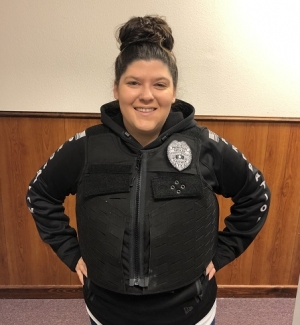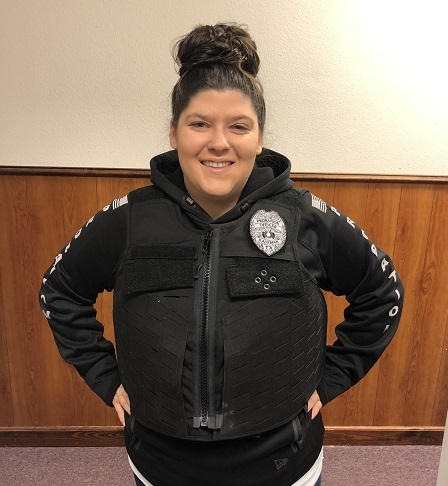The Department of Sociology introduces 2014 App State graduate Haylea Workman. Haylea earned two undergraduate degrees in political science and sociology (concentration in criminology, deviance, and law) and a Master's degree in Public Administration (Criminal Justice Administration). Here are her answers to questions about her success since graduation and how sociology has assisted with her accomplishments.
1. What have you been doing since you graduated from App State?
Once I graduated from undergrad at App State in 2014, I completed my Master's degree in Public Administration: Criminal Justice Administration in 2016. As soon as I graduated, I began applying for jobs in the criminal justice field. I applied for everything from corrections officer to case manager in a multitude of positions. I placed applications all over the United States, not just in North Carolina. Finally, three months after graduation, I received a job offer from Kaufman County Community Supervision and Corrections Department as a Mental Health Probation Officer in Kaufman, Texas. I started my position and was immediately placed in charge of two specialty courts, Drug Court and Mental Health Court. I eventually established and operated a new court program called Substance Abuse Reentry Court. While an officer, I made it a point to volunteer and get every certification possible. To name a few, I obtained the following certifications: Motivational Interviewing, Mental Health First Aid, Foundation Skills for Trainers, Trauma Informed Care, Natural Response Control Tactics, Firearms, and Basic Life Support. I remained a Probation Officer in Kaufman for six years when I moved into my new position as a United States Probation Officer for the Western District of Virginia.
2. How has sociology helped or prepared you for your recent successes?
My job as a probation officer involves many skills in different areas. Some may think I get to kick down doors all day and complete warrantless searches, but that is far from the truth. I am expected to be an officer of the court and hold people accountable to their court orders while also being a mentor, counselor, educator, social worker, medical aid, etc. I believe I accomplished these skill sets through my sociology education. I was able to learn through sociological theory the reasonings behind why people commit a crime. Understanding race and minority relations, gender construction, cultures, sexual deviance, and violence gave me the upper hand to address the issues brought to me daily. My job is to help offenders get back on track with their lives to become productive members of society. I cannot begin to address these problems without understanding where they grew up, their education level, social networks, employment history, mental health, and substance abuse issues. I must understand human behavior and how it relates to society to assist my caseload in forming better lifestyles.
The best example of this is Drug Court Programs. I create sanctions and incentives to behave in a way that does not condone other criminal attitudes or discourage offenders from progressing. For example, if someone tests positive for methamphetamine, I have multiple questions and concerns that run through my head: is this occasional or a pattern of use, has this person had substance abuse treatment, do they have family support, do they have a job, what is the home life like, are they being abused, do they have trauma, do they have a mental health issue, etc. Then I must determine how to change the behavior. For example, if I give them community service, do they have transportation to get there? If I provide them with a jail sanction, will it create further trauma issues? The question is, am I setting them up for failure?
Furthermore, once these programs are introduced, I must determine if the programs are successful. Program evaluations and evidenced-based practices come from the research often done through sociological studies. I used my education on how to complete program evaluations and implement evidence-based practices to further my career and show my understanding of my field. I must conduct risk assessments on each offender I meet with to determine best practices to assist the offender. Being able to understand risk-need-responsivity is the biggest takeaway from my sociological education. It is the center of the universe in criminal justice, and understanding these principles has led to my achievements as a probation officer.
3. What advice would you give a new sociology major moving forward in our program and into the job market?
My best advice to students is to plan internships around the career field they want to pursue. In addition, I have done more than one internship. Taking my internships thoughtfully provided me with the best advancement in my career. I obtained certifications through some of my internships, which helped me land my job as a Mental Health Probation Officer. I made a name for myself in every department I interned with. They provided excellent references for me as someone trying to enter the career field "without experience." I completed three internships throughout my time in college. I interned in Washington, DC, for a nonprofit organization, Durham County Jail and Caldwell Correctional Center.
Along with completing internships is networking. I used to despise networking with people in general. I did not know what to talk about or how to initiate a conversation. If you can learn networking skills (not just social media), it will allow you to form relationships in the community that will boost your career. My last piece of advice is not to confine yourself to one geographical location or one state. Having the ability to move around and take advancement where it comes enhances the chance for opportunity. I fully believe I would not have had the opportunity for growth the way I experienced if I had confined myself to North Carolina. Change is scary, and some may not want to move away from friends or family, but there is much more opportunity when you widen your horizons.
Thanks to Haylea for her insight, and congratulations on your success thus far!

